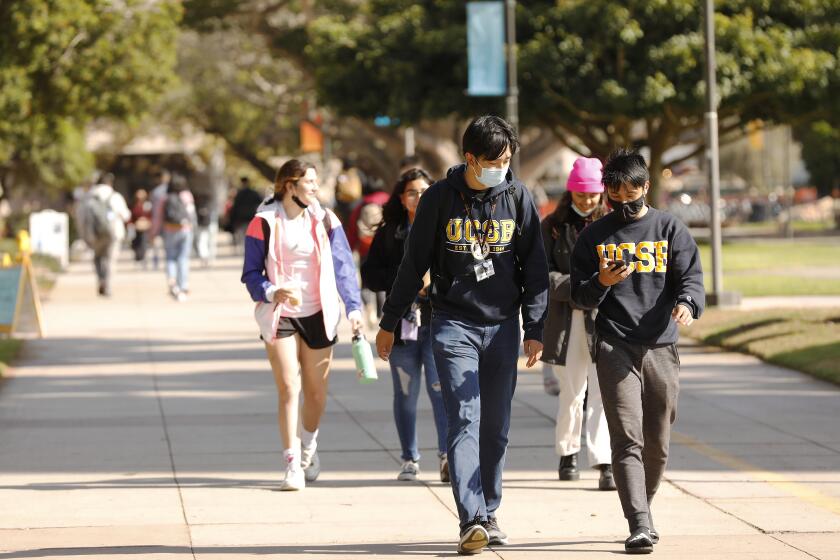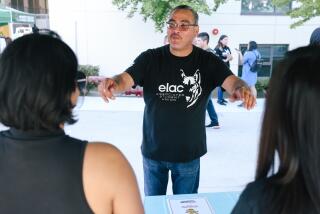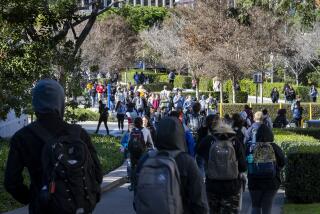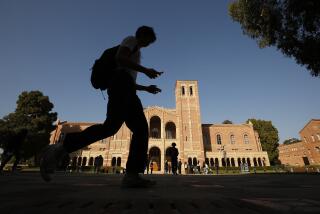Wave of California colleges extend remote instruction amid worsening Omicron surge
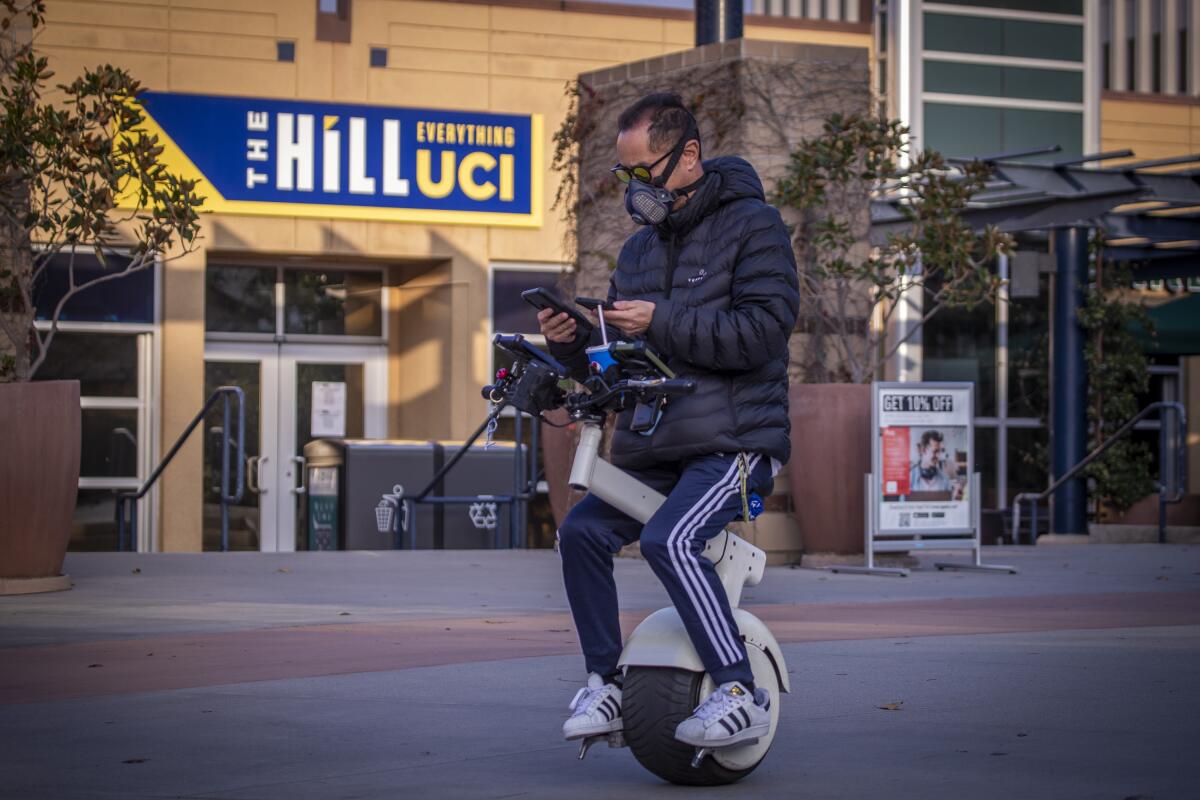
Amid a worsening Omicron surge, a growing number of California colleges and universities are delaying the start to in-person classes, including USC and UCLA.
Four more University of California campuses — UCLA, Berkeley, Riverside and Merced — announced Friday they would extend remote instruction to Jan. 31, following earlier announcements to do so by Davis, Irvine, Santa Cruz and San Diego. Cal State Northridge and Cal State Fullerton also announced remote starts this year alongside a handful of other campuses in the 23-campus California State University system.
California private universities, including USC, Stanford, Occidental and the five undergraduate Claremont Colleges, have also pushed back the start of in-person instruction.
The delayed in-person restart among colleges and universities contrasts with K-12 districts, such as Los Angeles Unified — the nation’s second-largest school system that is set to reopen Tuesday amid its highest positivity rate.
One key difference between the K-12 and university communities that may factor into the varied decisions is that college students are much more mobile than K-12 students and potentially more at risk of spreading the virus, said Dr. Kirsten Bibbins-Domingo, chair of UC San Francisco’s Department of Epidemiology and Biostatistics. Whether flying back to campus from outside the state or having free rein to move about beyond a campus, she said, the college campus population can make transmission difficult to contain.
“Colleges and young adults have a lot more freely mobile people that contribute to transmission than kids do,” she said.
Two major factors in UCLA’s decision to delay the in-person start until Jan. 31 were the rise in coronavirus cases among faculty, staff and students — which has topped 1,200 since the start of January — and a smaller than anticipated number of students who have received booster shots, officials said. Only about one-third of students have received the required shots.
“While we had hoped that our safety protocols and enhanced testing requirements would be sufficient to allow us to resume in-person instruction after next week, regional and campus trends in positivity rates, as well as staffing and operational concerns, have led us to conclude that an extension of remote education is the prudent course of action,” Administrative Vice Chancellor Michael J. Beck and Professor Megan McEvoy wrote to the community. Thirty-four percent of students have received required booster shots.
UCLA had initially instructed students to return to the Westwood neighborhood by Jan. 9 to begin rigorous testing. Officials are now allowing students to delay their travel.
Most classes at UC Berkeley, which starts Jan. 18, will be fully remote for the first two weeks of the semester before moving to in-person on Jan. 31. Some courses, such as lab sections, studio courses and clinical courses, may continue to be taught in-person during those first two weeks, officials said. UC Merced also announced it would delay the spring semester’s in-person classes until Jan. 31.
UC Santa Barbara, which started winter quarter Jan. 3, previously extended remote teaching for two weeks and still plans to resume in-person instruction on Jan. 18.
Riverside, Irvine, Davis, Santa Cruz and San Diego, whose winter quarters also began Jan. 3, similarly said that rising positivity rates for coronavirus infections had compelled them to push back the start of in-person instruction to Jan. 31. Davis had planned to return to campus on Monday, while UCLA, Irvine, Riverside, Santa Cruz and San Diego had earlier announced a Jan. 18 start.
“Navigating the challenges of another COVID-19 surge is certainly a difficult way to start another year,” UC Riverside Chancellor Kim Wilcox said in a message Friday to the campus community. He said he was hopeful that in-person instruction can resume after the surge, especially because the campus now has systems in place for testing, vaccinations and other resources.
The Riverside campus remains open, including the library, recreation center and student union building, and in-person research and student services are continuing. But large indoor events are banned until Jan. 31, although sports games will continue in the campus arena with no spectators.
At UC Irvine, Chancellor Howard Gillman told the campus community Thursday night that the campus positivity rate of those tested since Sunday was 13% — lower than the Orange County rate of 25% but still “simply too much disease transmission ... to assume safe in-person interactions.”
“Restarting in-person instruction when large numbers of students may not be able to take advantage of it is not reasonable or fair to students or to the faculty who would need to accommodate students who could not attend in-person instruction through no fault of their own,” he said.
UC Santa Cruz reported that its campus positivity rate was 5% from 3,000 tests run since Sunday, the highest it has been since testing began in 2020. The campus had averaged a 0.47% positivity rate among 129,972 tests administered between July 14, 2020, and Jan. 6 of this year.
UC San Diego said rising coronavirus cases were creating staffing shortages and affecting the ability of students to attend classes in person. It noted that simulation models that map real cases to predicted cases currently estimate the peak of infections will occur between now and the middle of January.
At UC Davis, Chancellor Gary May asked the campus community to stay in Davis during this time so as not to introduce new cases. “It’s going to be bumpy for a bit longer as Omicron impacts our community,” he said in a video message. “Again, please be patient as we determine how best to offer the education that you are here for.”
Cal State L.A. is the latest California college to announce that it is going online for the start of the new semester.
Cal State Northridge announced Friday that it would delay in-person instruction for most classes by three weeks, joining at least 10 other Cal State campuses that have announced delays.
In a letter to the community, Northridge President Erika D. Beck stressed that the shift in plans was temporary and that campus facilities and services will remain open to students and accessible in-person and online. Most classes will be held remotely from Jan. 24 until Feb. 14, although some courses will continue with an in-person start.
“This temporary measure will allow the January case spike to subside before beginning in-person instruction, which will help to minimize the spread of COVID-19 across our campus community, and ensure our faculty and staff are able to support a quality educational experience for our students,” Beck wrote.
Cal State Fullerton also announced Friday that it would delay the start of in-person classes by two weeks, while Cal State Long Beach and Cal State Los Angeles said they would go remote for three weeks of the semester. Other CSU campuses that will start remotely include San Diego, Sacramento, Channel Islands, Fresno, East Bay, San Marcos and San Francisco.
“Today, in light of the increasing spread of the Omicron variant in Orange County and California, we are continuing that decision-making with this announcement: We will begin our spring semester by delivering our courses remotely for the first two weeks of the semester (January 22-February 6),” President Fram Virjee wrote.
Some community colleges throughout the state, including Pasadena City College, will also move classes online for the first two weeks of the semester, while others retain a mostly hybrid schedule.
Cal State Student Assn. President Isaac Alferos said student leaders are supportive of the remote start. “It is critical that campus leaders across the system work with their student leaders to ensure an equitable rollout that centers our students first and foremost,” he said.
Among private universities, USC announced Friday that it will extend remote learning for four more days and will return to in-person instruction on Jan. 24, as will Occidental College. Stanford also plans to resume in-person instruction Jan. 24 for most undergraduate courses, although those that must be taught in person, such as labs and art, will begin meeting a week earlier.
The five undergraduate Claremont Colleges — Pitzer, Pomona, Claremont McKenna, Scripps and Harvey Mudd — will begin spring semester Jan. 18 as scheduled but use online instruction the first two weeks. Colleges will not allow guests from other campuses inside their own residence halls or apartments and will decrease indoor dining “as much as practicable,” Claremont McKenna President Hiram Chodosh wrote to the community this week.
More to Read
Sign up for Essential California
The most important California stories and recommendations in your inbox every morning.
You may occasionally receive promotional content from the Los Angeles Times.
